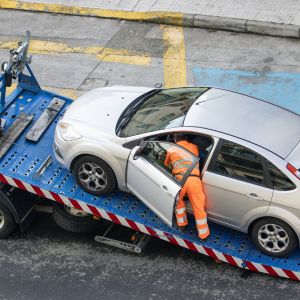Choosing the right roadside assistance service necessitates taking into account a number of factors. Determine the type of coverage you require first, such as towing, jump-starting, or fuel delivery. Then, compare the services provided and the coverage area of various providers to ensure they meet your requirements.
Consider the cost of the service, as well as whether it is included in your car insurance or available as an add-on. You should also look at the response time and customer reviews to get a sense of the provider’s dependability and service quality. Look for a service that provides 24-hour support and has a good track record of customer satisfaction.
What type of roadside assistance services does the company provide?

The type of roadside assistance services provided by a company can vary widely. Some companies offer basic services such as tire change, jump-start, and fuel delivery, while others provide a more comprehensive range of services such as towing, lock-out assistance, and winching. Here are some of the common types of roadside assistance services provided by companies:
- Towing: One of the most common types of roadside assistance is towing. If your vehicle is unable to be driven, they will provide a tow truck to transport it to a repair facility.
- Tire replacement: If you have a flat tyre, roadside assistance services can provide you with a spare tyre or assist you in replacing your flat tyre with the spare.
- Jump-starting: If your car’s battery dies, roadside assistance services can jump-start it to get it running again.
- Fuel delivery: If you run out of gasoline or diesel, some services will bring you a small amount to get you back on the road.
- Lock-out assistance: If you’ve locked your keys inside your car, lock-out assistance can help you get back in.
- Winching: Winching services can help you get your vehicle out of a ditch, mud, or snow.
- Battery replacement: If your battery dies and cannot be jump-started, some services can provide a replacement battery.
- If your vehicle is disabled, some services provide alternative transportation such as a rental car, taxi, or bus fare.
- Trip interruption coverage: If your vehicle is disabled, trip interruption coverage can help cover the costs of a hotel or rental car.
Does the roadside assistance service offer the types of services that you need?

It is critical for choosing the right roadside assistance that provides the services you require. Not all roadside assistance services are the same, and some may not provide the services you require. Consider the following factors when choosing the right roadside assistance:
- Towing is an important service if you frequently drive long distances or in remote areas. Make certain that the service you select offers towing if your vehicle breaks down and cannot be driven.
- Tire change: If you frequently drive on highways, a tyre change service can come in handy if you have a flat tyre. Check to see if the service you’re considering provides tyre changes.
- A jump-start service can be useful if you have a history of battery problems. Make certain that the service you select offers jump-start services if your battery dies.
- Fuel delivery: If you drive long distances frequently, fuel delivery can be useful if you run out of gas. Make certain that the service you select offers fuel delivery if necessary.
- Lock-out service: If you frequently leave your keys in your car, lock-out service can be very useful. Make certain that the service you select offers lockout assistance if necessary.
- Winching services can be useful if you frequently drive off-road or in rough terrain. Make certain that the service you select offers to winch if necessary.
- Battery replacement services can be beneficial if you have a history of battery problems. Make certain that the service you select offers battery replacement if necessary.
- Alternative transportation services can be very useful if you frequently drive long distances or need to get to appointments. Make certain that the service you select provides alternative transportation if necessary.
- Trip interruption coverage: If you drive long distances frequently, trip interruption coverage can be very useful. Make certain that the service you select provides trip interruption coverage if necessary.
Frequently Asked Questions
Q1. What should I consider when choosing the right roadside assistance service?

Ans: When choosing the right roadside assistance service, it is important to consider the type of coverage offered, the cost of the service, the response time, the availability of roadside assistance, and the reputation of the service provider. Basic roadside assistance services typically include basic services such as towing, jump-starting, fuel delivery, and lockout service. Premium roadside assistance services may include additional services such as tire changes, battery replacement, and mechanical labour.
Q2. Are there any differences between basic and premium roadside assistance services?
Ans: Yes, there are differences between basic and premium roadside assistance services. Basic roadside assistance typically offers basic services such as towing, jump-starting, fuel delivery, and lockout service. Premium roadside assistance services may include additional services such as tire changes, battery replacement, and mechanical labour. Premium services may also offer additional benefits such as a longer towing distance or longer membership period.
Q3. Can I add roadside assistance to my existing car insurance policy?
Ans: Yes, most car insurance companies offer roadside assistance as an optional add-on to their existing policies. It is important to check with your car insurance provider to see what coverage is offered and at what cost.
Q4. Are there any additional costs for using roadside assistance services?
Ans: Yes, there may be additional costs associated with using roadside assistance services. Depending on the type of service you select and the provider, you may be responsible for paying additional fees such as towing costs, labour costs, and parts costs. It is important to check with your service provider to determine what costs may be associated with using their service.

